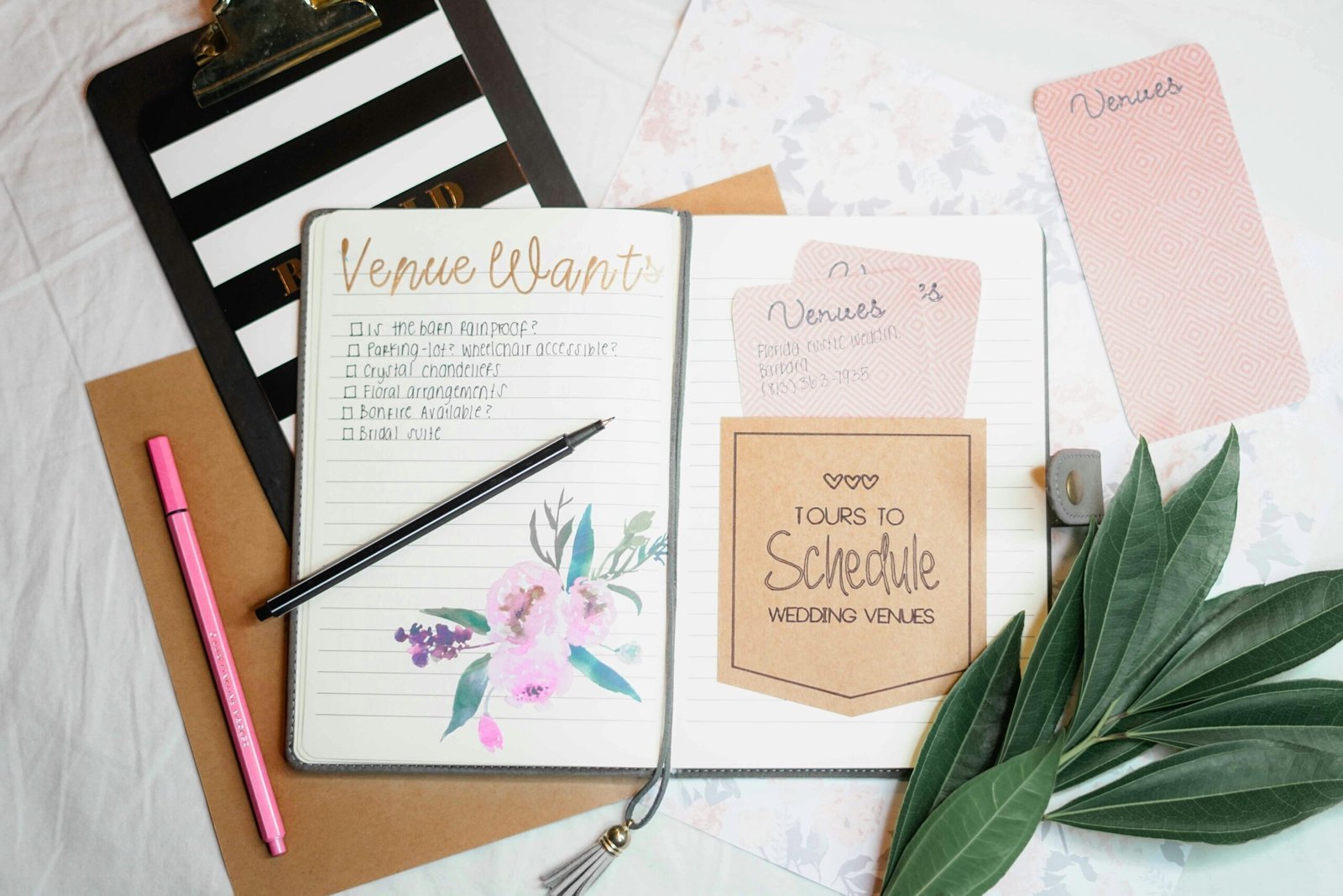Table of Contents
Planning a wedding is both exciting and challenging, especially when it comes to balancing faith, tradition, culture, and budget. As a South Asian Muslim bride, you want your big day to reflect your religious values while still being memorable and within your means. These top 10 tips cover essential aspects such as budgeting, venue selection, vendor management, and more to help you navigate through the wedding preparations with ease and confidence.
1. Set a realistic budget
The first step in any wedding planning process is establishing a realistic budget. You should always start by having a clear conversation with your family and fiancé about your wedding budget before you decide on the wedding day. This is because many couples often underestimate the costs associated with weddings, and it’s important to be on the same page financially.
Here’s how you can set a realistic budget together:
- Create a Vision: Discuss what’s most important to both of you, whether it’s the venue, food, or decor. This helps identify priorities.
- Research Wedding Costs: Look into average costs for different vendors and services in your area to get an idea of what’s realistic.
- Make a List: Break down your budget into categories (e.g., venue, catering, attire) and decide how much to allocate to each.
- Track and Adjust: Use a spreadsheet or budgeting tool to monitor expenses and adjust as necessary.
A well-planned budget keeps you grounded, preventing stress later. For instance, by knowing exactly how much you can spend, you’ll be better equipped to focus on vendors and services within your price range, ensuring you don’t get sidetracked by extravagances that could stretch your budget thin.
2. Prioritise your must-haves
With your budget in place, it’s easier to prioritise what’s most important for your big day. Every bride dreams of a perfect wedding day, but reality sometimes means making choices. Once you’ve set your budget, the next step is to prioritize. Start by asking yourself: what’s most important to you? Is it the food, the decor, or a special cultural ceremony? By focusing on your must-haves, you can allocate more of your budget to those areas while keeping other elements simple.
This method also helps you avoid getting carried away with unnecessary extras. For instance, you might decide to splurge on a gorgeous bridal lehenga, while cutting back on more minor details like extravagant floral arrangements. Ultimately, this is about making sure the things that matter most shine through on your special day.
3. Book venues early
Ensure your venue fits cultural and religious requirements
Booking early allows you ample time to collaborate with venue staff, ensuring they can accommodate any specific requirements that might come with South Asian Muslim weddings. This can include creating separate seating areas for men and women, arranging prayer spaces, or confirming that the caterer provides Halal food. Addressing these needs well in advance gives you peace of mind and helps the venue make adjustments to meet your expectations.
Secure popular venues and avoid peak season rush
Popular wedding locations often get reserved quickly, especially during high-demand months like May through August. By booking at least six to twelve months in advance, you not only increase your chances of securing your dream venue but also reduce the stress of last-minute searching. Venues that are highly sought-after are typically the ones that offer the best amenities or have a significant reputation, which makes them book out even faster. Locking in your venue early also ensures a smoother wedding planning process since you can coordinate your decor, catering, and entertainment accordingly.
Avoid price hikes and secure better rates
A key advantage of early booking is the opportunity to secure the venue at a lower cost. Venue prices often rise closer to wedding seasons due to demand. By making an early reservation, you can lock in the current rates and avoid any surprise price hikes later. This can be a real benefit for brides working within a budget, helping you stay on track without sacrificing the quality of your venue.
Maximise flexibility and coordination with vendors
An early booking gives you the flexibility to choose from a wider range of dates, which is critical when coordinating with other vendors like photographers, caterers, and entertainment. You’ll have more options to ensure that your chosen vendors are available on the same day. Having more time to work out these details will reduce the likelihood of last-minute compromises, making your planning process much less stressful.
4. Make the Most of Online Wedding Planning Tools
In today’s digital age, countless online resources can transform your wedding planning experience from overwhelming to enjoyable. Here’s how to leverage these tools effectively:
- Budgeting Tools: Use online budgeting calculators and spreadsheets to keep track of your expenses. Websites like WeddingWire and The Knot offer customisable budget planners to help you allocate funds wisely and avoid overspending.
- Checklists and Timelines: Stay organized with downloadable wedding planning checklists. These resources break down the tasks you need to complete leading up to your big day, ensuring you don’t miss any important details. Many websites offer tailored timelines based on your wedding date.
- Inspiration Boards: Create Pinterest boards to collect ideas for your wedding theme, decor, and attire. This visual tool allows you to curate a cohesive style that reflects your vision, making it easier to communicate your ideas with vendors.
- Wedding Planning Apps : Download apps designed specifically for wedding planning. Tools like Zola and Bridebook offer features for managing guest lists, RSVPs, and seating charts, all in one place, making it easier to stay organised.
- Community Forums: Join online communities and forums where brides share their experiences, tips, and support. Websites like Reddit’s wedding community or Facebook groups can provide a wealth of information and a sense of camaraderie.
By utilising these online wedding planning tools, you’ll not only simplify the planning process but also gain access to a world of inspiration and support, ensuring your wedding day is everything you dream it to be.
5. DIY where possible
Adding a personal touch to your wedding doesn’t always mean spending a fortune. Many aspects of the wedding can be DIYed, giving your event an intimate and heartfelt feel. From handmade wedding favors to creating your own simple decor, these small projects can make your wedding more special—and help save on costs. Plus, gathering your bridesmaids and family for these DIY projects can be a fun way to bond while preparing for the big day.
Using tools like Canva for wedding invitations or creating custom mehndi trays adds a personal element that guests will remember. The money you save can then be reallocated to other important areas of your wedding budget, like catering or photography.
6. Research and compare vendors
Take time to research and compare different vendors for catering, henna, and decor. To ensure they are trustworthy and reliable, always ask for recommendations, read reviews on their social media page or website, and get multiple quotes before making any final decisions. Negotiating a package deal with vendors can also save you money.
Remember that the more experienced vendors may charge higher prices, but their expertise and quality of service can be worth the investment in the long run. I’ve frequently heard brides freak out over “affordable” vendors who don’t deliver on their wedding day and then end up spending more money trying to fix the mistakes. To avoid falling into this pitfall, don’t just look at the price tag; it’s important to ask questions about the vendor’s policies, their experience and communicate your budget and preferences clearly to ensure a smooth planning process.
Another thing to keep in mind is that wedding suppliers frequently do not provide complete refunds after a deposit has been placed for a particular service. Due to their already narrow profit margin, many of the rates they list are likewise non-negotiable. So friends, do your best research!
7. Plan ahead for outfits
Bridal outfits are often one of the largest expenses in South Asian weddings, but planning ahead can help you avoid last-minute splurges. Consider shopping early to take advantage of sales or even exploring the option of renting a bridal outfit. Alternatively, wearing a family heirloom can be both a budget-friendly and sentimental choice, connecting you to your family’s traditions.
8. Limit the guest list
It’s tempting to invite everyone you know, especially in larger South Asian communities, but sometimes less is more. A smaller guest list allows for a more intimate celebration, where you can truly spend time with the people who matter most to you and your partner.
I know firsthand how attending weddings out of obligation can be more of a challenge than a joy. When one of my nieces was getting married, I was really excited at first. But on the day of the wedding, my excitement began to fade when I found myself facing a five-hour journey in the summer heat, dressed in heavy embroidered clothes and an abaya. What made me feel more miserable was the fact that I spent more time in the car than I did at the wedding, and since we weren’t that close to the bride, I couldn’t justify such discomfort, and it made me rethink the whole experience.
This made me realise that it’s not just about the guest count but also the experience you create for your guests. Inviting people out of obligation or extending the guest list just to accommodate everyone can lead to discomfort and regrets on both sides.
9. Delegate responsibilities
Don’t be afraid to lean on your loved ones for help. South Asian Muslim weddings often involve several pre-wedding events, and delegating responsibilities can take a huge weight off your shoulders. Whether it’s asking your siblings to help with the Mehndi or having a friend manage RSVPs, delegating tasks allows you to enjoy the planning process instead of feeling overwhelmed.
10. Remember what matters most
Planning a wedding can be both a joyful and challenging process, but with careful preparation and clear priorities, you can create a day that reflects your love, faith, and culture. Your wedding should be a beautiful reflection of your journey, filled with memories that you and your loved ones will cherish for years to come.



